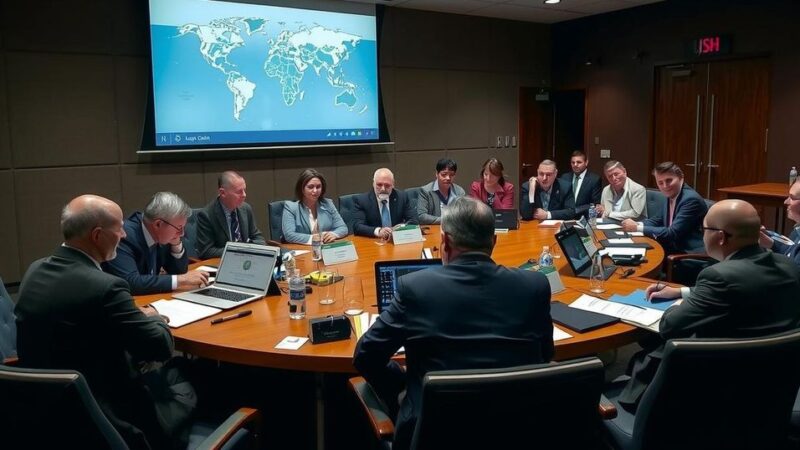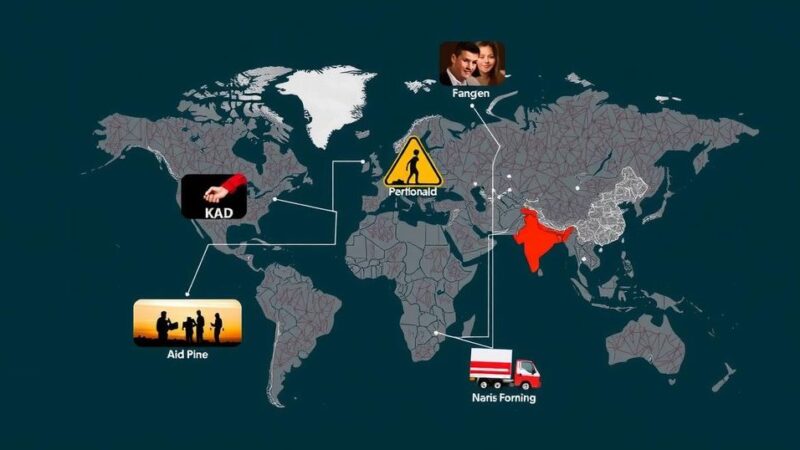Leaders from the Asia-Pacific region addressed the UN General Assembly, emphasizing the urgent risks posed by climate change and the disproportionate impact on their nations. They called for global audacity to act decisively, citing financial support as critical for enhancing climate resilience and sustainable development efforts. Central themes included the need for comprehensive action against rising sea levels and extreme environmental challenges, underlining the existential nature of the crisis for small island developing states.
During a recent session of the UN General Assembly, leaders from the Asia-Pacific region articulated the immediate threats posed by climate change, emphasizing that their nations are among the most vulnerable. Prime Ministers from Vanuatu, Papua New Guinea, Samoa, Lao People’s Democratic Republic, Tuvalu, and Tonga collectively called upon the global community to take decisive actions to combat climate change, presenting the United Nations as a critical platform for unified efforts. They outlined the pressing need for climate resilience and called for enhanced financial support from the international community. Charlot Salwai Tabimasmas, Prime Minister of Vanuatu, pertinently stated, “If the current carbon emissions trajectory continues its dangerous path, Vanuatu stands zero chance to measure up to its recently gained status as a developing state.” He stressed the urgency for prompt action, citing grave concerns from the latest IPCC report about breaching critical temperature thresholds within the next decade. James Marape, Prime Minister of Papua New Guinea, criticized the prevailing ethos of “survival of the fittest,” cautioning that the unsustainable exploitation of natural resources is jeopardizing future generations and threatening current developmental aspirations. He highlighted the significant barriers in accessing climate finance, imploring fellow world leaders to act swiftly to assist nations like his own. Feleti Penitala Teo, Prime Minister of Tuvalu, brought attention to alarming projections regarding rising sea levels, indicating that by 2050, 50% of Tuvalu’s land will experience regular flooding, escalating to over 90% by 2100. He described this situation as dire, urging immediate reinforcement of coastlines to mitigate disastrous outcomes. Samoan Prime Minister Fiame Naomi Mata’afa echoed these sentiments, advocating for a scaled-up implementation of investments to counter climate impacts, warning that small island developing states face unique vulnerabilities that necessitate urgent climate actions. She asserted, “We must do more to turn the tide, to honour our commitments and obligations, and to take urgent and ambitious climate action now.” Sonexay Siphandone, Prime Minister of the Lao People’s Democratic Republic, acknowledged the far-reaching consequences of climate change for his nation, emphasizing a commitment to participate in global environmental protection efforts while seeking enhanced international support. The Prime Minister of Tonga, Siaosi ‘Ofakivahafolau Sovaleni, reiterated the existential threats imposed by climate change and highlighted the rapid rise in sea levels that could cause the erasure of entire islands, thereby affecting their cultural heritage. He declared, “This is not just about losing land – it is about our very identities, losing heritage and culture.” Overall, these leaders presented a unified front, urging immediate international action to address the devastating impacts of climate change, underscoring that failure to act could lead to irrevocable damage not only to their nations but to the world at large.
The article reflects the increasing urgency communicated by leaders from the Asia-Pacific region regarding the severe impacts of climate change on their nations. These small island developing states are experiencing the brunt of climate-induced challenges, including rising sea levels and extreme weather events. The discussions at the UN General Assembly emphasized the role of the United Nations as a vital forum for mobilizing global action and resources to combat these issues. The leaders called for enhanced financial support and collaborative efforts to increase resilience against climate vulnerabilities, showcasing their commitment to sustainable development and the protection of their environments.
In summary, the voices of the Asia-Pacific leaders at the UN General Assembly reveal an urgent call for global responsibility in addressing climate change. Their shared experiences illustrate the severe threats posed by climate dynamics, particularly to small island nations. Collective action, financial support, and a commitment to sustainability are paramount to mitigate these challenges and protect not only their futures but that of the entire planet.
Original Source: news.un.org






